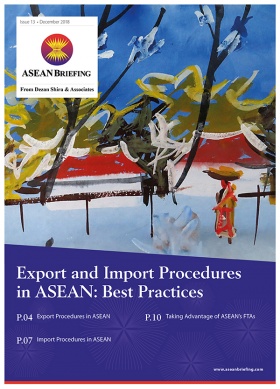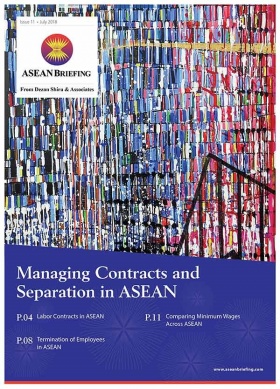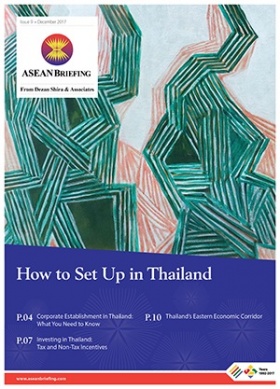Thailand Plus: New Stimulus Package for Foreign Investment
On September 6, 2019, Thailand introduced a stimulus package called “Thailand Plus” that contains a wide variety of measures to attract foreign investment.
Thailand Plus covers seven key points, including the introduction of new tax incentives and deductions as well as reforms and initiatives designed to improve the ease of doing business.
The package was reportedly designed for companies affected by the US-China Trade War that would like to relocate to another country in Asia. Authorities in Thailand hope the move will give it a competitive edge over other low-cost neighbors, like Vietnam, particularly as the Thai economy is growing at its weakest in five years, due to a downturn in exports, tourism, and farming.
Investors looking to take advantage of the new stimulus package should seek to develop a base understanding of the new Thailand Plus scheme before assessing factors that may benefit their business. Meanwhile, several of the initiatives announced as part of the package still require implementation measures.1. Tax incentives for investments
Through the Eastern Economic Corridor (EEC) – a special economic zone – Thailand offers investors corporate income tax (CIT) exemptions for the first 13 years and 50 percent reduction for the next five. Under Thailand Plus, companies are eligible for a further five years of 50 percent CIT reductions if they invest at least Thai Bhat 1 billion (US$32 million) provided the investment is realized by the end of 2021.
2. Tax deductions for STEM development
Foreign investors that employ highly-skilled personnel in the field of science, technology, engineering, and mathematics (STEM) are eligible for CIT tax deductions of 200 percent for training expenses related to projects endorsed by the Ministry of Higher Education, Science, Research and Innovation, beginning in the 2019-20 financial year (FY).
Further, investors that are engaged in the development of advanced technology are entitled to 200 percent CIT tax deductions during the 2019-20 FY, for business investments or training expenses.
3. Deductions for investment in automation systems
Businesses looking to engage in automation systems and robotics can receive a CIT reduction of 200 percent from the 2019-20 FY. The government is pushing the country’s automation and robotics industry to help move the manufacturing sector – a backbone of the economy – further up the value chain and provide greater export-driven revenue streams.
4. Amendment to the Foreign Business Act
The government will amend the Foreign Business Act – the main law that regulates foreign business activities in Thailand – to be better integrated with regulations issued by the Thailand Board of Investment (BOI), the government agency responsible for foreign investment promotion.
The amendment includes simplifying the process for obtaining visas and work permits for foreign investors, in addition to improving information sharing between the BOI and relevant state agencies.
5. Establishment of an investment and steering committee
The BOI, in cooperation with the government, will establish an investment and steering committee, which will be chaired by the prime minister. The aim of the committee is to help facilitate investments – particularly large investments – through a ‘one-stop service’ that addresses laws and regulations that delay the investment process.
Investors will need to wait for upcoming regulations that clarify the exact powers of the committee and how they will coordinate with the existing Investment Law.
6. Expanding free trade networks
The government will seek to expand the country’s existing free trade agreements (FTAs) under the Thailand Plus initiative. The stimulus package will aim to revive the Thailand-EU FTA, which stalled in 2014, as well as joining the Comprehensive and Progressive Agreement for Trans-Pacific Partnership (CPTPP).
7. Development of new special investment zones
The government is set to develop special investment zones for companies from individual countries, namely South Korea, Japan, China, and the US. Investors will need to monitor for upcoming regulations that explain how these special investment zones are implemented.
Thailand’s value-added manufacturing potential
In a press release issued by the BOI, Deputy Secretary-General to the Prime Minister Kobsak Pootrakool said, “Thailand’s economic development policy is in line with South Korea’s New Southern Policy, China’s Belt and Road Initiative, the Indo-Pacific strategy of Japan and the US, and India’s Look East Policy”.
Pootrakool elaborated, “Thailand is also a prominent hub linking the countries in mainland Southeast Asia, or CLMVT (namely Cambodia, Laos, Myanmar, Vietnam and Thailand), and ACMECS (Ayeyawady-ChaoPhraya-Mekong Economic Cooperation Strategy) area”.
This context illustrates the government’s interest in deepening its integration with regional and international trade networks, a prerequisite for attracting increased foreign investment. But in addition to attracting new investors, and particularly those that would like to shift part of a supply chain from China, the latest stimulus package will help foreign investors who already have a foothold in the country, particularly those in high-value manufacturing sectors, such as electronics and automotive.The country’s automotive industry, for instance, is already the largest in Southeast Asia in terms of production and will benefit from the proposed tax breaks as it aims to adopt more robotics and automation systems. The electronics sector, another prominent industry, is also looking to robots to become more competitive and efficient.
Another high-value manufacturing sector that could benefit from the tax deduction for STEM is Thailand’s aerospace industry, and maintenance, repair and overhaul (MRO) services.
Thailand’s major airlines in Bangkok Airways and Thai Lion Air have all established MRO centers to service their aircraft and those of airlines that service Thailand and the region. Thai Airways has also developed MRO facilities in a joint venture with Airbus in 2018, offering maintenance and line services.
ASEAN Briefing is produced by Dezan Shira & Associates. The firm assists foreign investors throughout Asia and maintains offices throughout ASEAN, including in Singapore, Hanoi, Ho Chi Minh City and Jakarta. Please contact us at asia@dezshira.com or visit our website at www.dezshira.com.







